Text
Want a sneak peek into our offices? 🎥✨
Discover the magic behind our dental oasis, the Promenade Center of Dentistry.
From our welcoming reception area to our modern treatment rooms, every corner is designed with your comfort in mind. Ready to see it all in person? 😄
Book your visit now, and let us make your dental journey extraordinary. 🦷🌟
#PromenadeCenterofDentistry #DentalSanctuary #CuttingEdgeTechnology #FriendlyAmbiance #SmileWithUs #BookYourAppointment #ExtraordinaryDentalCare #CharlotteNC #DentalJourney
0 notes
Text
The Impact of Modern Dentures on Quality of Life
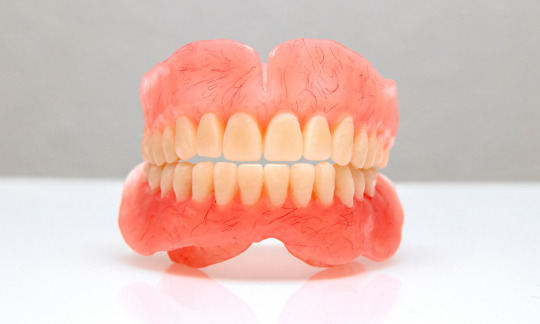
The absence of teeth can affect various aspects of daily life, going beyond mere appearance. It can disrupt chewing, speech, and self-assurance. While dentures have historically been a solution for missing teeth, advancements in technology and materials have transformed them into a superior option.
Enhanced Comfort and Fit
Gone are the discomfort and instability associated with poorly fitting dentures. Modern dentures are tailor-made using precise mouth impressions, ensuring a snug fit. This eliminates past issues like sores and irritation. Additionally, lightweight acrylic materials enhance comfort, allowing for extended wear.
Improved Stability and Confidence
Today's dentures offer remarkable stability, thanks to strategic placement and enhanced suction techniques. This stability enables wearers to eat, speak, and socialize confidently, without fearing slippage or clicking.
Natural-Looking Aesthetics
Modern dentures are designed to mimic natural teeth closely. Materials are chosen to replicate real teeth's color, shape, and translucency. Dentists can customize denture teeth to harmonize with facial features, resulting in a smile that appears authentic.
Increased Durability
Modern dentures boast improved durability, resisting chipping, cracking, and staining better than before. With proper care, they can last for many years, providing long-term reliability.
Improved Chewing Ability
Beyond aesthetics, dentures play a vital role in oral health by facilitating improved chewing function. This allows wearers to comfortably enjoy a wider range of foods, preventing digestive issues and malnutrition.
Speech Enhancement
Well-fitted dentures fill mouth gaps, aiding clear speech and confident pronunciation. They alleviate potential speech impediments caused by missing teeth.
Boost in Self-Confidence
A complete and natural-looking smile can significantly boost self-confidence. Modern dentures restore this confidence, enabling wearers to smile freely and engage confidently in social interactions.
Types of Modern Dentures
Modern dentures come in two main types:
Full Dentures: Replacing all teeth in the upper, lower, or both jaws.
Partial Dentures: Utilized when some natural teeth remain, filling in gaps and clasping onto existing teeth for support.
Dentists recommend the most suitable type based on individual needs and the extent of tooth loss.
Caring for Your Modern Dentures
Proper care is essential for maintaining denture condition and longevity:
Brushing: Daily brushing with a soft-bristled toothbrush and non-abrasive denture cleanser.
Soaking: Overnight soaking in a denture cleaning solution removes plaque and food particles.
Handling: Gentle handling, rinsing thoroughly before insertion and removal.
Regular Dental Checkups: Scheduled visits ensure proper denture fit and overall oral health maintenance.
Modern dentures offer a reliable means to replace missing teeth and restore smile function and aesthetics. With their enhanced comfort, stability, and natural appearance, modern dentures significantly improve quality of life. If considering dentures, consult your dentist to explore the possibilities of regaining a confident, healthy smile.
0 notes
Text
How to prevent food stains on teeth
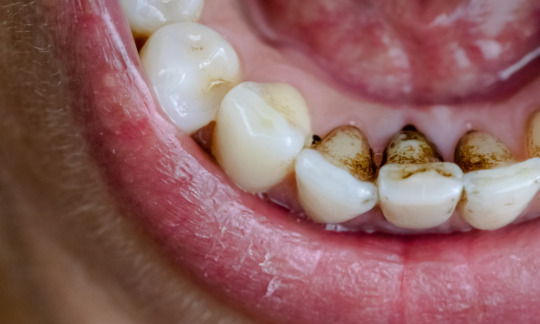
Understanding the origins of food stains on teeth is crucial for preserving a radiant smile. When we consume certain foods and beverages, pigmented molecules latch onto the enamel, causing gradual discoloration. This not only impacts the aesthetics of our smile but also affects oral hygiene. Thus, taking proactive measures to prevent food stains on teeth is essential for maintaining confidence in our smile. Let’s explore effective strategies for achieving this goal.
Best Practices for Preventing Food Stains on Teeth
Brushing and flossing after meals are fundamental habits for preserving oral health. Promptly removing food particles and plaque prevents stains from adhering to the enamel. Additionally, rinsing the mouth with water after consuming staining foods aids in washing away residue, reducing the chances of discoloration. Using a straw when drinking staining beverages like coffee or tea minimizes direct contact with the teeth, further preventing stains.
Food and Drinks to Avoid for a Stain-Free Smile
Certain foods and drinks are notorious for causing teeth stains. Coffee and tea contain tannins and chromogens, which can penetrate the enamel, resulting in discoloration over time. Similarly, red wine and dark sodas contain acidic compounds and pigmented molecules that contribute to staining. Berries and tomato-based foods also pose a risk due to their rich pigment content, which can adhere to the tooth surface and cause discoloration.
Natural Remedies to Combat
Food Stains In addition to preventive measures, natural remedies can help combat food stains and maintain a bright smile. Brushing with baking soda gently removes surface stains without harming the enamel. Similarly, applying lemon juice or apple cider vinegar can lighten stains due to their acidic properties. However, it's important to use these remedies sparingly and rinse thoroughly to prevent enamel erosion. Chewing sugar-free gum after meals stimulates saliva production, neutralizing acids and washing away food particles, thereby reducing the risk of stains.
Professional Teeth Whitening Options
For those desiring more significant results, professional teeth whitening options are available. In-office whitening treatments conducted by dental professionals utilize powerful bleaching agents to remove stubborn stains and brighten the smile in a single session. Take-home whitening kits offer convenience and flexibility, allowing users to whiten their teeth at their own pace under professional guidance. Over-the-counter whitening products such as whitening strips and gels provide a more affordable option for brightening teeth, though results may vary.
Conclusion
In summary, maintaining a bright, stain-free smile is achievable through simple yet effective strategies. By integrating regular brushing and flossing, rinsing after meals, and avoiding staining foods and drinks, you can prevent discoloration and promote overall oral health. Additionally, natural remedies and professional whitening options offer further solutions for combating stubborn stains and achieving a radiant smile. Prioritize oral hygiene and make informed choices to preserve the brilliance of your smile for years to come.
0 notes
Text
Post-Tooth Extraction Diet: A Guide to Optimal Healing
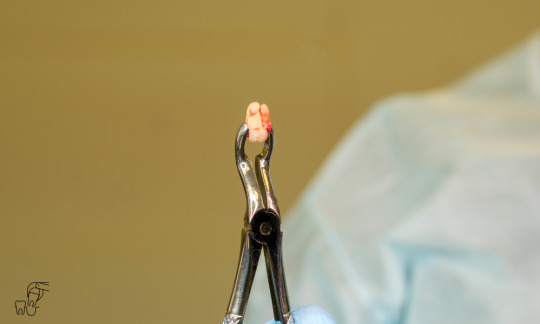
After undergoing a tooth extraction, proper post-operative care, including dietary considerations, is crucial for optimal healing. Your diet plays a significant role in the recovery process, influencing your comfort and the speed of tissue repair. Understanding which foods to avoid after tooth extraction can help prevent complications and promote a smooth recovery.
Why Diet Matters After Tooth Extraction
Your body requires essential nutrients to repair tissues and fight off potential infections. Following a tooth extraction, the surgical site is sensitive and vulnerable to irritation or infection. Consuming the right foods can support the healing process by providing necessary nutrients without causing harm to the extraction site.
Supporting Healing Through Food Choices
Opting for soft, easily digestible foods minimizes the risk of disrupting the blood clot formation at the extraction site, which is crucial for proper healing. These foods also reduce the strain on your jaw and teeth, allowing for a more comfortable recovery. Additionally, certain foods have anti-inflammatory properties that can help alleviate swelling and discomfort.
Foods to Avoid After Tooth Extraction
To ensure a smooth recovery and prevent complications, it's essential to steer clear of certain types of foods:
Hard or Crunchy Foods:
Nuts and Seeds
Chips and Pretzels
Raw Vegetables and Fruits
Hot or Spicy Foods:
Spicy Sauces and Seasonings
Hot Beverages
Excessively Hot Foods
Foods with Small Particles:
Popcorn
Seeds or Grains
Small Candies or Particles
Acidic or Citrusy Foods:
Citrus Fruits
Tomato-Based Sauces
Soda and Other Acidic Beverages
Sticky or Chewy Foods:
Taffy and Caramels
Gum
Chewy Candies
In Summary
Avoiding certain foods after tooth extraction is essential for promoting healing and reducing the risk of complications. Stick to a soft diet consisting of nutritious, easy-to-chew foods to support your recovery. Remember to maintain good oral hygiene practices and follow your dentist's post-extraction dietary guidelines for optimal healing. With proper care and attention to your diet, you can ensure a smooth and speedy recovery process.
0 notes
Text
A Tour of Our Dental Office!
Welcome to Promenade Center for Dentistry! Join us for a virtual tour of our modern and welcoming dental office, where we strive to make your visit as comfortable and stress-free as possible. From the moment you step inside, our friendly front office staff will greet you with a smile and help you check in. Relax in our welcoming reception area with a refreshing beverage before your appointment.
Experience a thorough and gentle teeth cleaning in our hygiene rooms, designed for optimal oral health. Our team of skilled hygienists will ensure your smile is gleaming and healthy. For more complex procedures, our state-of-the-art surgical suite is equipped with the latest technology for optimal care and comfort. Say goodbye to dentist office jitters and hello to a positive dental experience at Promenade Center for Dentistry!
#dentaloffice #dentistvisit #oralhealth #dentaltour #dentaltechnology #modern dentistry #dentalcare #dentalsurgery #dentalhygiene #promenadecenterfordentistry #dentalexperience #comfortabledentistoffice #dentalcleaning #smilegleaming #stressfreedentist #positivedentalvisit #dentalanxietyrelief #welcomingdentistoffice #optimaloralhealth
#dental office#dentist#dental care#dentist visit#dental appointment#oral health#dental cleaning#dental procedures#surgical suite#dental technology#modern dentistry#dental tour#dental office tour#dental practice#dental hygiene#dental staff#dental patients#dental experience#dental anxiety#dental comfort
0 notes
Text
Soft Foods To Eat After Tooth Extraction

Following a tooth extraction, it's vital to consume gentle, soft foods that won't disturb the extraction site and will aid in the healing process. While adhering to your dentist's post-operative guidelines, which may include dietary restrictions, incorporating nourishing soft foods can enhance your recovery experience and expedite healing. In this educational blog, we'll discuss 10 soft food options suitable for consumption after tooth extraction, detailing their benefits and how they can facilitate a speedy recovery.
Tooth Extraction Recovery Overview Recovering from a tooth extraction varies based on individual factors and the complexity of the procedure. Nonetheless, there's a general recovery timeline that most individuals can anticipate. Here's a typical progression:
Day 1: Immediate Aftermath
Bleeding: Some bleeding is normal; your dentist will provide a gauze pad to control it.
Pain Management: Discomfort is common; your dentist may prescribe or recommend pain relievers.
Swelling: Applying ice packs can help reduce swelling around the extraction site.
Days 2-3: Initial Healing Phase
Continued Pain Management: Follow your dentist's instructions for pain relief.
Swelling: Swelling may peak and gradually diminish.
Soft Diet: Stick to soft foods like yogurt, mashed potatoes, and soup to avoid irritation.
Avoid Straws: Using straws can dislodge the blood clot, impeding healing.
Days 4-7: Ongoing Healing
Pain and Swelling: Should continue to improve; contact your dentist if symptoms worsen.
Healing of Extraction Site: A blood clot forms to protect the area.
Stitches Removal: If stitches were used, your dentist may remove them.
Weeks 2-3: Continued Progress
Pain and Swelling: Should decrease further.
Diet: You can begin reintroducing solid foods, starting with soft options.
Activity: Gradually resume normal activities, avoiding strenuous exercise.
10 Soft Foods for Tooth Extraction Recovery
Yogurt: High in protein and gentle on the mouth.
Mashed Potatoes: Nutrient-rich and easy to chew.
Applesauce: Provides essential vitamins and fiber.
Smoothies: Customizable and packed with nutrients.
Soup: Hydrating and easy to consume.
Oatmeal: Filling, rich in fiber, and customizable.
Scrambled Eggs: Soft, protein-rich, and easy to chew.
Cottage Cheese: Soft, protein-packed, and calcium-rich.
Pudding: Comforting and easy to swallow.
Smooth Nut Butter: Protein and healthy fats for sustained energy.
Conclusion Selecting appropriate soft foods post-tooth extraction is crucial for a smooth recovery. By incorporating these nutritious options into your diet, you can ensure proper nutrition while promoting healing and minimizing discomfort. Follow your dentist's recommendations, avoiding foods that may irritate the extraction site. With the right diet and care, you'll be back to normal soon.
0 notes
Text
Periodontal Treatment in Promenade Center For Dentistry
Suffering from periodontal disease? Then, get Periodontal Treatment in Charlotte, NC today and enjoy a healthy smile.
0 notes
Text
Coffee After Wisdom Teeth Removal: Forbidden Or Permitted?

Imagine this scenario: you’ve just said goodbye to your wisdom teeth, and as the effects of anesthesia wear off, the world appears somewhat blurry. Amidst the throbbing pain, you find yourself craving that familiar cup of coffee, your reliable companion for mornings and midday slumps alike. But pause — is it a forbidden pleasure or a permissible indulgence after wisdom teeth removal? Let’s embark on a caffeinated journey to unravel the mysteries behind the steam and beans.
Navigating the Coffee Dilemma: Prohibited or Allowed?
The Aftermath of Extraction: A Fragile Phase The process of wisdom teeth removal involves delicate healing. The sites where the teeth were extracted are sensitive, and exposing them to certain substances too soon can hinder the recovery process. Coffee, with its acidic properties, might seem like an adversary in this situation. The initial 24 to 48 hours post-surgery demand extra care, and enjoying a hot cup of coffee might not be the wisest decision during this critical period.
Mind the Heat: Hot Coffee and Healing Wounds The warmth of freshly brewed coffee can offer comfort but can also be deceiving. While the idea of a hot beverage is soothing, the heat from the coffee can potentially cause complications. Exposing the extraction sites to high temperatures may result in increased bleeding and prolonged discomfort. So, before taking a sip, consider the temperature and its potential impact on your healing process.
Acidity and Sensitivity: Is Coffee to Blame? Coffee, known for its acidity, has the potential to irritate the delicate, healing tissue in your mouth. This acidity may not be suitable for the immediate post-extraction period. However, as your recovery progresses, your tolerance to acidic substances may increase. Understanding the delicate balance between your coffee cravings and oral recovery is crucial to avoid any undesirable consequences.
Inflammation and Stimulants: Coffee’s Effect on Recovery Caffeine, a natural stimulant present in coffee, can affect your body’s healing process. It may disrupt your sleep, potentially impeding the body’s ability to recover effectively. Additionally, caffeine can lead to heightened heart rate and blood pressure, which may not align well with the post-surgery recovery phase. Moderation is key, as excessive caffeine consumption could compromise your overall healing process.
Allowed Pleasures: When Can You Indulge?
Initial Period of Restraint In the immediate aftermath of wisdom teeth removal, exercising patience is crucial. It’s advisable to refrain from hot beverages, including coffee, during the initial days of recovery. Opt for lukewarm or cold alternatives to satisfy your cravings without jeopardizing your healing process.
Gradual Reintroduction
As your recovery progresses and your oral surgeon gives the go-ahead, you can slowly reintroduce coffee into your routine. Begin with mild, low-acid options and ensure your brew is at a comfortably warm temperature. This gradual approach enables you to assess your body’s response and adjust accordingly.
Post-Extraction Precautions
When you finally decide to enjoy that cup of coffee, take extra precautions. Use a straw to minimize direct contact with the extraction sites and avoid excessive sugar or cream, as these may introduce unwanted irritants. Hydration is vital during the recovery period, so balance your coffee intake with adequate water consumption.
In the balancing act between coffee cravings and post-wisdom teeth removal precautions, the key lies in moderation and timing. While the initial days call for restraint, the aroma of a freshly brewed cup need not be permanently banished. As your recovery progresses, so does your ability to relish the forbidden pleasure responsibly. So, before taking that first sip after surgery, consult with your oral surgeon, listen to your body’s cues, and let your coffee ritual seamlessly blend with your recovery journey. After all, healing doesn’t mean bidding farewell to every pleasure — it’s about embracing them with mindfulness and moderation.
#Coffee After Wisdom Teeth Removal#Wisdom Teeth Removal#promenade center for dentistry charlotte#charlotte dentist
0 notes
Text
Want to instantly whiten your teeth? Our assistant Ashna gives you a glimpse into the process of ZOOM whitening! 🦷
#white #zoom #dentaltok #dentist #teethwhitening
0 notes
Text
Exploring the Potential of Stem Cell Dental Implants

Dentures, bridges, and implants have long been the go-to solutions for replacing missing teeth. But what if you could skip the artificial replacements and grow entirely new teeth instead? This exciting possibility lies in the realm of stem cell dental implants.
What are Stem Cell Dental Implants?
Unlike traditional implants, which use titanium screws surgically anchored in the jawbone, stem cell implants harness the body's own regenerative potential. These implants rely on stem cells, undifferentiated cells capable of developing into various specialized tissues, including teeth.
How Does it Work?
The process generally involves three stages:
Stem Cell Collection: Stem cells can be sourced from wisdom teeth, baby teeth, or even bone marrow.
Scaffold Creation: A biocompatible 3D scaffold, mimicking the shape of a tooth, is designed to guide the stem cells.
Implantation & Regeneration: The scaffold containing the stem cells is implanted in the jawbone. Guided by the scaffold and signaling molecules, the stem cells differentiate into various dental tissues, creating a new, functional tooth.
What are the Benefits?
Growing teeth instead of implanting them offers several potential advantages:
Natural Appearance & Function: The regenerated tooth would be biologically identical to your natural teeth, leading to better aesthetics and functionality.
Faster Healing: Stem cells may promote faster integration with the surrounding bone, reducing healing time.
Reduced Risk of Rejection: By using your own cells, the risk of rejection associated with traditional implants is minimized.
Potential for Additional Applications: This technology might expand to treat gum disease, jawbone defects, and even nerve damage.
Where are We Now?
While the concept is promising, stem cell dental implants are still in their early stages of development. Extensive research and clinical trials are needed before it becomes a widely available treatment option.
Looking Ahead
The potential of stem cell technology to revolutionize dentistry is undeniable. While challenges remain, continued research and innovation pave the way for a future where missing teeth become a thing of the past. So, keep an eye out – your next dental visit might involve growing a brand new smile instead of getting an implant!
0 notes
Text
Why Should You Get Dental Implants?

Are you missing one or more teeth and looking for a permanent solution that restores your smile and confidence? Dental implants may be the ideal option for you. Unlike traditional dentures or bridges, dental implants offer a long-lasting and natural-looking solution for replacing missing teeth. Let's explore why you should consider getting dental implants and the numerous benefits they offer.
The Benefits of Dental Implants
Restore Functionality: Dental implants function just like natural teeth, allowing you to eat, speak, and smile with confidence. Unlike removable dentures, which may slip or cause discomfort while eating or speaking, dental implants are firmly anchored in the jawbone, providing stability and functionality comparable to natural teeth.
Preserve Jawbone Health: When a tooth is lost, the underlying jawbone may begin to deteriorate over time due to lack of stimulation. Dental implants act as artificial tooth roots, stimulating the jawbone and preventing bone loss. By preserving jawbone density, implants help maintain facial structure and prevent the sunken appearance that can occur with tooth loss.
Long-Term Durability: Dental implants are designed to be a permanent solution for tooth replacement. With proper care and maintenance, they can last a lifetime, making them a cost-effective investment in your oral health and overall well-being. Unlike dentures or bridges, which may need to be replaced every few years, dental implants offer long-term durability and reliability.
Natural Appearance: Dental implants are custom-designed to blend seamlessly with your natural teeth, providing a natural-looking and aesthetically pleasing smile. Whether you need to replace a single tooth or multiple teeth, implants can be tailored to match the size, shape, and color of your existing teeth, ensuring a harmonious and natural appearance.
Improved Oral Health: Unlike traditional bridges, which require the alteration of adjacent healthy teeth for support, dental implants do not compromise the integrity of surrounding teeth. This preserves the health and structure of adjacent teeth, reducing the risk of decay and periodontal disease. Additionally, dental implants are easy to clean and maintain, promoting better oral hygiene and reducing the risk of gum disease.
Enhanced Self-Confidence: Tooth loss can have a significant impact on self-esteem and confidence, affecting social interactions and overall quality of life. Dental implants restore not only your smile but also your self-confidence, allowing you to speak, laugh, and engage in social activities without feeling self-conscious about your teeth.
Convenience and Comfort: Dental implants eliminate the need for adhesives or special cleaning routines associated with removable dentures. Once in place, implants feel and function just like natural teeth, providing comfort and convenience without the hassle of removable prosthetics.
Get Your Dental Implants Done at Promenade Center for Dentistry Charlotte
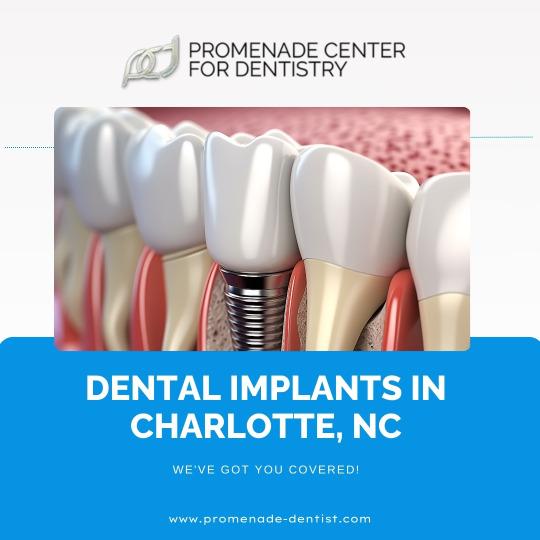
Are you considering dental implants in Charlotte, NC? Look no further than Promenade Center for Dentistry Charlotte. Our team of experienced and dedicated dental professionals is committed to providing top-quality care and personalized treatment to help you achieve a healthy, beautiful smile.
Why Choose Promenade Center for Dentistry Charlotte for Your Dental Implants?
Expertise and Experience: Our dentists have extensive experience in placing dental implants and restoring smiles with precision and skill. With years of training and expertise, you can trust that you're in capable hands at Promenade Center for Dentistry Charlotte.
State-of-the-Art Technology: We utilize the latest advancements in dental technology to ensure optimal outcomes for our patients. From digital imaging and computer-guided implant placement to advanced sterilization techniques, we prioritize safety, comfort, and precision in every aspect of your treatment.
Customized Treatment Plans: At Promenade Center for Dentistry Charlotte, we understand that every patient is unique, which is why we tailor our treatment plans to meet your specific needs and goals. Whether you need to replace a single tooth or multiple teeth, we'll create a customized plan that addresses your concerns and delivers exceptional results.
Comprehensive Care: From the initial consultation to the final restoration, we provide comprehensive care every step of the way. Our team will guide you through the entire dental implant process, ensuring that you feel informed, comfortable, and confident in your treatment decisions.
Patient-Centered Approach: Your comfort and satisfaction are our top priorities at Promenade Center for Dentistry Charlotte. We strive to create a warm, welcoming environment where you can relax and feel at ease during your dental implant procedure. Our friendly staff is here to answer any questions you may have and ensure that your experience is positive from start to finish.
In conclusion, dental implants offer a multitude of benefits for individuals seeking a permanent and reliable solution for tooth replacement. From restoring functionality and preserving jawbone health to providing a natural appearance and enhancing self-confidence, implants can have a transformative effect on your oral health and overall well-being. If you're considering tooth replacement options, consult with a qualified dentist to determine whether dental implants are right for you. Invest in your smile today and enjoy the lifelong benefits of dental implants. And if you're in Charlotte, NC, remember to choose Promenade Center for Dentistry Charlotte for exceptional care and personalized treatment.
0 notes
Text
Finding the Right Dentist in Charlotte, NC: A Comprehensive Guide
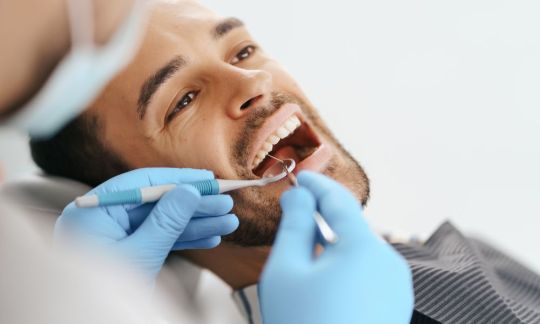
When it comes to oral health, choosing the right dentist is a crucial decision. Living in Charlotte, NC, you have a plethora of options, making it essential to navigate through the choices wisely. This guide will help you in making an informed decision on selecting the best dentist in Charlotte, NC, without using the mentioned words.
Research and Recommendations: Start your search by gathering information about dentists in the area. Seek recommendations from friends, family, or colleagues who have had positive experiences with local dentists. Online reviews and testimonials can also provide valuable insights into the quality of services offered.
Credentials and Qualifications: Ensure that the dentist you choose is qualified and holds the necessary credentials. Check for certifications, licenses, and memberships in professional dental associations. A well-qualified dentist is more likely to provide reliable and effective oral care.
Specializations and Services: Consider your specific dental needs and look for a dentist who specializes in the relevant areas. Whether you require general dentistry, cosmetic procedures, or specialized treatments, finding a dentist with expertise in the services you need is essential for comprehensive oral care.
Accessibility and Convenience: Choose a dentist whose location and office hours align with your schedule. Accessibility is crucial, especially in emergencies. Opt for a dental clinic that is conveniently located and has flexible hours to accommodate your lifestyle.
Technology and Advanced Treatments: Stay updated on the technology and treatments offered by the dental practice. A dentist who invests in advanced technology is likely to provide modern and efficient dental care. From digital X-rays to laser treatments, these advancements contribute to a better overall patient experience.
Conclusion
In conclusion, selecting the right dentist in Charlotte, NC, involves careful consideration of various factors. Promenade Center For Dentistry Charlotte stands out as a leading choice in the region. With a team of highly qualified professionals, a range of specialized services, and a commitment to advanced dental care, Promenade Center For Dentistry Charlotte ensures optimal oral health for its patients.
Remember, making an informed decision based on your unique needs is key to maintaining good oral health. So, take the time to research, consider recommendations, and prioritize the factors that matter most to you in your quest for the best dentist in Charlotte, NC.
0 notes
Text
How to Avoid a Tooth Extraction Infection
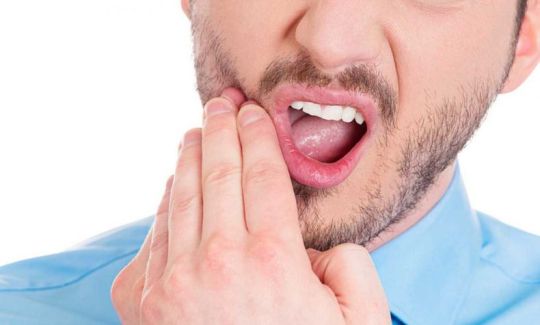
Tooth extractions, while sometimes necessary, can be daunting experiences. The fear of pain and discomfort is often accompanied by the worry of potential complications, and high on that list is tooth extraction infection. But fear not, fellow smile-keepers! By understanding the risks and taking some simple precautions, you can significantly reduce your chances of facing this unpleasant post-extraction hurdle.
Understanding the Enemy: Tooth Extraction Infection
A tooth extraction creates an open wound in your mouth, and like any wound, it's susceptible to bacterial invasion. This invasion can lead to an infection, characterized by symptoms like:
Increased pain and swelling: While some pain after extraction is expected, worsening or persistent pain is a red flag.
Fever: Your body's natural response to fight infection.
Bad breath and unpleasant taste: Telltale signs of bacterial activity.
Pus drainage: White or yellow discharge from the extraction site.
Swollen lymph nodes: Your body's immune system working overtime.
Prevention is Key: Your Post-Extraction Defense Plan
Fortunately, several steps can significantly lower your risk of a tooth extraction infection:
Meticulous oral hygiene: Gently brush and floss (avoiding the extraction site directly) to remove food debris and bacteria. Use lukewarm salt water rinses several times a day to promote healing and reduce swelling.
Medications as prescribed: Take all antibiotics and pain medication exactly as directed by your dentist. Don't skip doses or stop prematurely, even if you feel better.
Dietary choices: Stick to soft, bland foods that require minimal chewing to avoid irritating the extraction site. Avoid hot, spicy, and acidic foods that can promote discomfort.
Rest and relaxation: Your body needs energy to heal. Get plenty of rest and avoid strenuous activities that could put stress on the extraction site.
Smoking is a no-go: Smoking hinders healing and increases the risk of infection. Avoid smoking and secondhand smoke altogether during the healing process.
Follow-up appointments: Attend all scheduled follow-up appointments with your dentist to monitor healing and address any concerns promptly.
Remember: Early intervention is crucial! If you experience any signs of infection after your tooth extraction, don't hesitate to contact your dentist immediately. Timely treatment can prevent complications and ensure a smooth recovery.
By following these simple yet effective tips, you can ensure your tooth extraction journey is as comfortable and complication-free as possible. So, keep those pearly whites healthy, smile wide, and face your extraction with confidence!
0 notes
Text
Should I Brush Immediately After Eating?
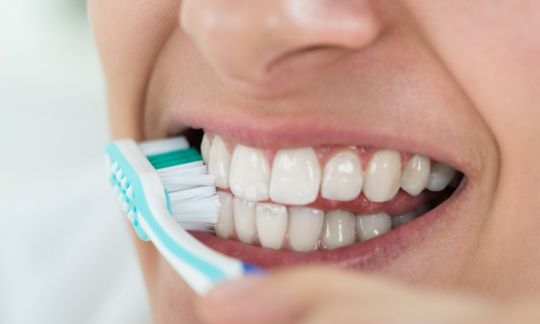
Brushing your teeth is an essential part of maintaining good oral health. It helps to remove plaque, a sticky biofilm that contains bacteria, which can lead to cavities, gingivitis, and other dental problems. However, there is a common misconception that you should brush your teeth immediately after eating. This is not always the case.
The Role of Saliva
After you eat, your saliva plays a crucial role in neutralizing the acids produced by bacteria. These acids can weaken and erode tooth enamel, the hard outer layer of your teeth. When you brush too soon after eating, you can disrupt the buffering effect of saliva and actually damage your enamel.
Acid Challenge
The more acidic the food you eat, the longer you should wait before brushing. This is because acidic foods can lower the pH level in your mouth, making it more susceptible to enamel erosion. Foods like citrus fruits, tomato products, and carbonated beverages are particularly acidic.
The Optimal Waiting Period
Promenade Center For Dentistry Charlotte recommends waiting at least 30 minutes after eating before brushing. This gives your saliva time to neutralize the acids in your mouth and restore its normal pH balance. If you've eaten something particularly acidic, you may want to wait even longer, up to 60 minutes.
Alternatives to Brushing
If you can't wait 30 minutes to brush, there are a few things you can do to protect your enamel:
Rinse with water. This will help to remove food particles and reduce the acidity in your mouth.
Chew sugar-free gum. Sugar-free gum stimulates saliva production, which can help to neutralize acids and remineralize tooth enamel.
Use a tongue scraper. A tongue scraper removes bacteria and debris from your tongue, which can contribute to bad breath and gum disease.
Brushing Before Bed
While it's generally not advisable to brush your teeth immediately after eating, brushing before bed is essential. This is because your mouth produces less saliva while you sleep, making it more vulnerable to bacterial growth and plaque buildup.
Additional Tips for Maintaining Oral Health
In addition to brushing and flossing regularly, here are some other tips for maintaining good oral health:
Limit sugary drinks. Sugary drinks are a major source of acid-producing bacteria in the mouth.
Avoid snacking between meals. Snacking increases the frequency of acid attacks on your teeth.
Get regular dental checkups and cleanings. Your dentist can help to identify and treat any oral problems early on.
By following these tips, you can keep your teeth and gums healthy for years to come.
0 notes
Text
What specialized tools are used by dentists?
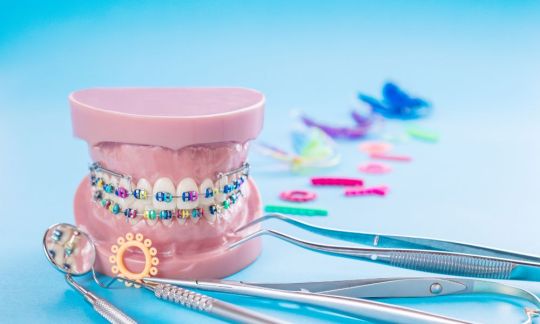
Ever wondered about the specialized tools that dentists use to ensure your oral health stays in top-notch condition? Just like any skilled professional, dentists rely on a range of specialized instruments to perform various tasks during routine check-ups, cleanings, and more advanced dental procedures. Let's take a closer look at the tools that play a crucial role in maintaining your radiant smile.
Unveiling the Dental Toolkit: Picture a dentist's toolkit as a set of precision instruments, each designed for a specific purpose to address the complexities of oral care. From basic examinations to intricate dental surgeries, these tools are the unsung heroes behind your dentist's ability to diagnose, treat, and maintain your oral health.
Dental Mirror and Explorer:
Role: These are the detectives of the dental world. The mirror helps dentists visualize hard-to-reach areas inside the mouth, while the explorer is used to detect cavities or irregularities in the tooth's surface.
Scaler:
Role: Dental hygienists often use scalers to remove plaque and tartar from the teeth. This instrument ensures a thorough cleaning by reaching areas that regular brushing may miss.
Dental Drill:
Role: Often a source of anxiety for patients, the dental drill is a high-speed tool used for various procedures, including cavity preparation and tooth reshaping. Modern drills are equipped with features to minimize discomfort and noise.
Air/Water Syringe:
Role: This tool combines air and water to rinse and dry the oral cavity during procedures. It helps maintain a clear view for the dentist and ensures a clean and comfortable experience for the patient.
Dental Loupes:
Role: Precision is paramount in dentistry. Dental loupes are magnifying glasses that dentists wear to enhance their vision, allowing for more accurate and detailed work.
X-ray Machine:
Role: X-rays are a vital diagnostic tool in dentistry. They help dentists visualize the internal structures of teeth and identify issues such as cavities, infections, or impacted wisdom teeth.
Dental Forceps:
Role: When tooth extraction becomes necessary, dental forceps are the go-to instruments. They come in various shapes and sizes, tailored to different types of teeth and extraction scenarios.
Dental Handpieces:
Role: These are motorized tools that include the dental drill. They play a crucial role in various dental procedures, from removing decay to shaping teeth for crowns or veneers.
Local Anesthetic Syringe:
Role: To ensure a pain-free experience, dentists use local anesthetics delivered through a syringe. This numbs the area being treated, making dental procedures more comfortable for patients.
Dental Impression Materials:
Role: For procedures like crowns, bridges, or orthodontic work, dentists use impression materials to create molds of the teeth. These molds help in crafting custom-fit dental appliances.
Understanding the Significance: The use of specialized dental tools goes beyond routine cleanings; it extends to more complex procedures that address a wide array of oral health issues. The precision, versatility, and advancements in these tools contribute to the effectiveness of dental treatments while prioritizing patient comfort.
In essence, the dentist's toolkit is a symphony of instruments, each harmonizing to create beautiful smiles and maintain optimal oral health. So, the next time you find yourself in the dental chair, appreciate the craftsmanship behind these specialized tools, knowing they are essential for preserving the health and aesthetics of your teeth.
Finding Your Charlotte Dentist:
If you're in Charlotte, NC, and seeking expert help with tooth discoloration, consider connecting with a qualified dentist who can personalize a treatment plan for your specific needs. Remember, a radiant smile is yours for the taking – with the right knowledge, care, and perhaps a little help from a skilled Dentist in Charlotte, NC, you can reclaim your confident, pearly white grin and let your smile shine!
0 notes
Text
Why Do Teeth Hurt When Brushing Daily?
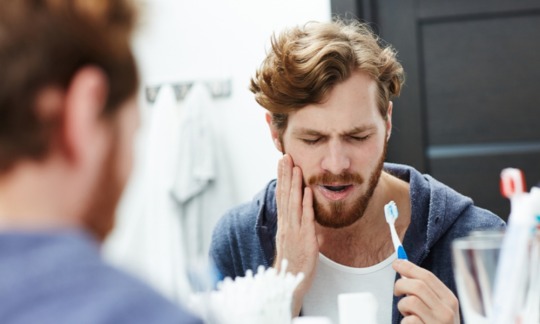
At Promenade Center for Dentistry in Charlotte, we are dedicated to unraveling the mysteries of dental health and providing insightful information to our valued patients. One common concern that individuals often encounter is experiencing tooth sensitivity or pain during their daily brushing routine. Let's explore the reasons behind this phenomenon and ways to alleviate discomfort:
Why do teeth hurt when brushing daily? Unveiling the Causes:
Brushing Technique:
Aggressive brushing or using a toothbrush with hard bristles can lead to enamel wear and gum recession, causing sensitivity and pain during brushing.
Tooth Decay:
Cavities or decayed areas on the teeth's surface can be sensitive to brushing, resulting in discomfort or pain.
Gum Issues:
Inflamed or receding gums expose the sensitive root surfaces, making them more prone to pain and discomfort during brushing.
Tooth Sensitivity:
Some individuals naturally have more sensitive teeth, making them susceptible to pain when exposed to various stimuli, including daily brushing.
Toothpaste Ingredients:
Certain toothpaste formulations, especially those with whitening agents or high abrasive content, can contribute to tooth sensitivity and cause discomfort during brushing.
Acidic Foods and Beverages:
Regular consumption of acidic items can weaken enamel, making teeth more sensitive and prone to pain when brushed.
Understanding Tooth Sensitivity:
Tooth sensitivity is a common issue, and it's crucial to address the underlying causes to promote optimal oral health. At Promenade Center for Dentistry, we emphasize a comprehensive approach to manage tooth sensitivity and ensure a pain-free brushing experience.
Tips to Alleviate Tooth Sensitivity During Daily Brushing
Choose the Right Toothbrush:
Opt for a toothbrush with soft bristles to avoid unnecessary abrasion on enamel and gums. Gentle, circular motions during brushing are recommended.
Use Toothpaste for Sensitive Teeth:
Select a toothpaste specifically designed for sensitive teeth, containing desensitizing agents that help alleviate discomfort.
Avoid Aggressive Brushing:
Gentle brushing is key. Avoid applying excessive pressure, as it can lead to enamel wear and heightened sensitivity.
Limit Acidic Foods and Beverages:
Reduce the consumption of acidic items, such as citrus fruits and sodas, to prevent enamel erosion and minimize tooth sensitivity.
Regular Dental Check-ups:
Schedule routine dental check-ups to identify and address any underlying dental issues contributing to sensitivity. Early intervention can prevent further discomfort.
Customized Treatment Plans:
Our experienced dental professionals at Promenade Center for Dentistry can create personalized treatment plans to address your specific concerns and provide effective solutions for tooth sensitivity.
Promenade Center for Dentistry: Your Partner in Dental Wellness:
At Promenade Center for Dentistry in Charlotte, we prioritize your dental well-being and aim to provide comprehensive care to address issues like tooth sensitivity during daily brushing. Our team of skilled professionals is committed to guiding you toward optimal oral health and a pain-free brushing experience.
If you're experiencing tooth sensitivity or pain during daily brushing, don't hesitate to reach out to us. We're here to assess your unique situation, provide tailored solutions, and ensure that your oral health journey is comfortable and rewarding. Remember, a healthy smile begins with understanding and addressing the factors that contribute to tooth sensitivity.
0 notes
Text
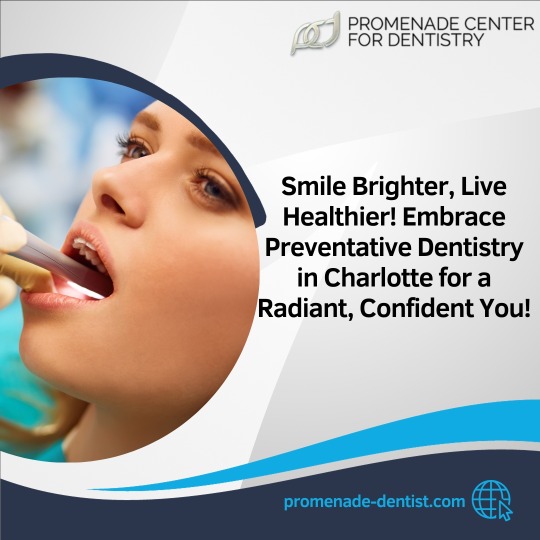
Smile Brighter, Live Healthier! Embrace Preventative Dentistry for a Radiant, Confident You! | Promenade Center For Dentistry Charlotte
Enhance your smile and oral health with Preventative Dentistry. Proactive care for a brighter, healthier future. Schedule your appointment today!
#Preventative Dentistry#dentist charlotte#charlotte dentist#Promenade Center For Dentistry Charlotte
0 notes